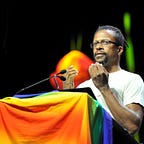Criminal? Justice?
What if instead of building our civic order around “police” and “criminal justice” we actually built it around public safety? As a progressive faith leader, I resent the idea of any autonomous human being “policed” and the assumption of a reciprocal relationship between “criminality” and “justice” seems inadequate at best. These terms mutually reinforce the binaries of our culture around right and wrong, good and bad and they play into the tragic racial interpretation of a binary black and white in America.
With the depth and breadth of racism in our country, strategies that can ultimately fix the overwhelming impact of police violence against black people will need to factor in the ethical, moral and spiritual violence that racism has been for over 400 years. Even if we never teach an ignorant white male cisgender police officer to recognize the humanity of a black trans woman (although I wish to God we could) our laws must represent her full humanity and protect her equally well. Currently, they do not. As long as we frame justice in the black and white terms of how one is policed or how someone is a criminal in contrast with innocent justice we will never have public safety in full nuanced color.
This is not a conversation for legislators to have alone. Nor is it exclusively up to police forces who, nationwide are notoriously bad at policing themselves. In fact, this is not a conversation. It is a national reckoning and a cultural reconciliation. It is first a reckoning in that the exchange must take full accountability for the way racism has both been a motivator for and a result of policing. In a nation that has even within my lifetime struck down laws that “policed” people’s movement based on their race[1], real change means coming to terms with the ways in which non-white Americans have been herded, punished, abused and manipulated like sub humans with no agency. It is a reconciliation in that reform must not simply erase all efforts at public safety. There should be a way to deal with people who commit grievous acts against one another, abuses, violence etc. But that system must not have any trace of the racist assumptions that assign guilt based on skin color, phenotype, sexual and gender orientation and other factors that we call “marginal”. More importantly, it must not offer varying degrees of safety solely based on the proximity one has to whiteness. We must all have access to safety.
This type of change can be led by faith leaders. We are people who study and interpret and untangle the ancient violent history of Roman oppression, the Ottoman Empire, the Egyptian enslavement of the Israelites, and more current crimes of Jim Crow, lynching, Chinese exclusion, Japanese internment and our modern immigration debacle. We are trained to deal with the human condition in real time. Our perspective is unique and crucial. Our job should not just be to pray after the fact of tragedy. We are also called in our leadership to offer prophetic insight that points to the consequences of being out of covenant with our fellow beings. One thing is sure, whether you identify with a faith tradition or not, the question of dismantling what we have come to accept as police and criminal justice must begin with wrestling deeply with moral and ethical questions of humanity or it simply devolves into negotiating degrees of what becomes for some, martial law.
It is time for faith leaders to raise their voices and help re-imagine and advocate for a public safety policy built on human equity not on racist misconceptions of assumed guilt and racist cultural tropes. With the question of policing and criminal justice being an issue of human dignity and quite simply an issue of life and death, there is no faith “leader” in this moment who can afford to follow.
[1] https://www.history.com/topics/black-history/black-codes
Originally published at http://spirituwellness.org on June 1, 2020.
